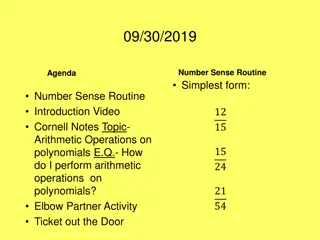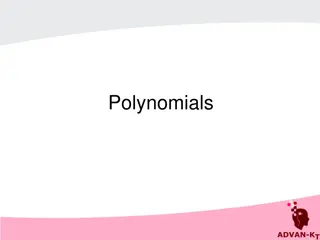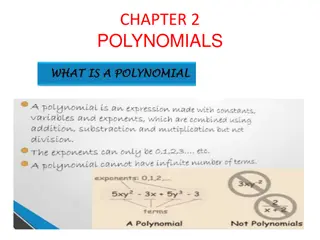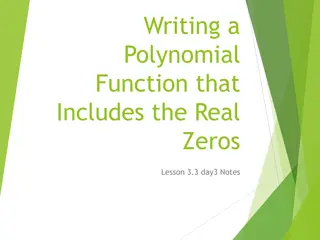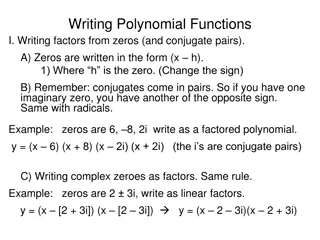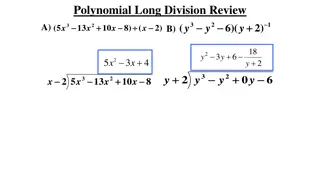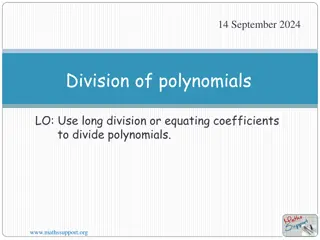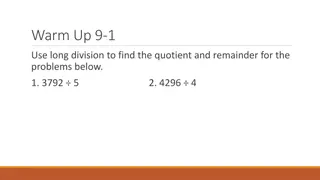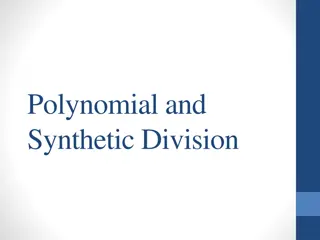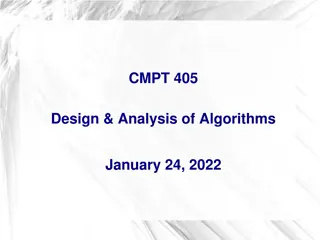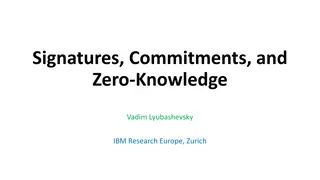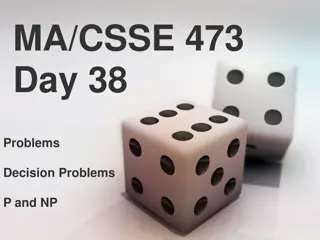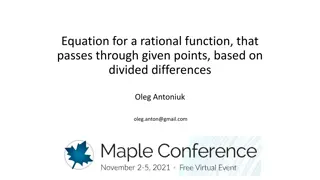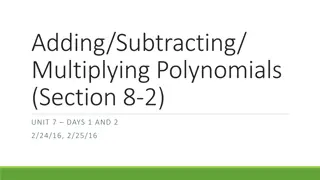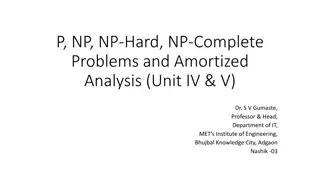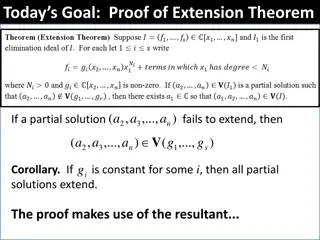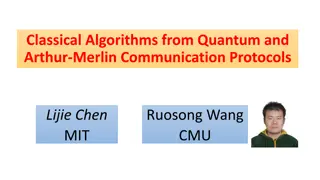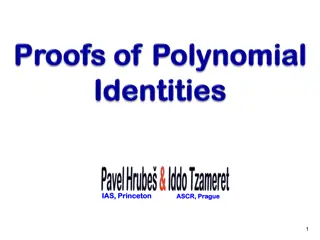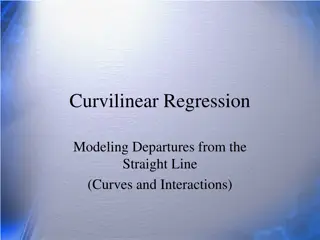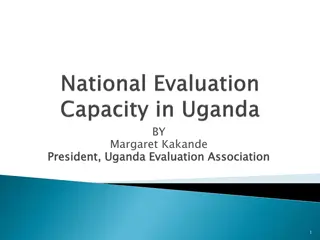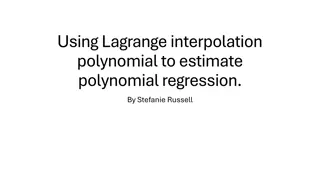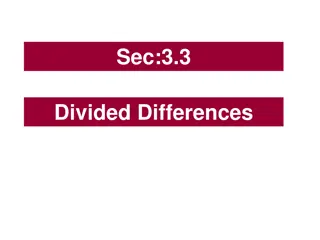Universal Evaluation Framework: Simplifying Evaluation Processes
This session introduces the Universal Evaluation Framework (UEF) developed for evaluating QAA Scotland Enhancement Themes. Participants learn key evaluation questions, evidence capture, and the Theory of Change to enhance evaluation confidence. The QAA Scotland Evaluation Odyssey details historical
5 views • 14 slides
Polynomial-time Pseudodeterministic Construction of Primes and Motivational Challenges
Exploring the challenges and advancements in generating prime numbers, particularly focusing on a pseudodeterministic construction method within polynomial time. The discussion includes reviewing previous approaches, fundamental computational problems related to primes, motivational problem statemen
0 views • 40 slides
Introduction to Arithmetic Operations on Polynomials
This unit focuses on developing an understanding of polynomials in mathematical expressions. You will learn about the parts of a polynomial, polynomial operations, and representing polynomials. The topics cover performing arithmetic operations on polynomials, identifying variables in expressions, le
2 views • 71 slides
Evaluation in Education
Evaluation in education is a comprehensive term that encompasses measurement, testing, and qualitative examination of student behavior. It involves both quantitative and qualitative descriptions, along with value judgments. Differentiating from mere measurement, evaluation provides a deeper analysis
1 views • 28 slides
Polynomial Functions and Operations
Polynomial functions are mathematical functions in the form of an expression involving variables and coefficients. They can be manipulated through operations like addition, subtraction, multiplication, and division. Learn about polynomial degrees, identifying polynomials, and performing various oper
2 views • 20 slides
Polynomial Degrees and Special Names
The degree of a polynomial is determined by its highest exponent, with specific names for each degree level. From the basic constant to the nth degree polynomial, this guide showcases the different degrees and their characteristics, helping you grasp the concept of polynomial functions easily.
1 views • 18 slides
Polynomials: Types, Degrees, and Zeroes
Polynomial expressions consist of terms with non-zero coefficients. They can have any number of terms and different degrees. Linear polynomials have a degree of one, quadratic polynomials have a degree of two, and cubic polynomials have a degree of three. Zeroes of a polynomial are the values of the
0 views • 17 slides
Polynomial Functions with Real Zeros
Learn how to identify and write polynomial functions that include real zeros, find zeros of given functions, explore the Fundamental Theorem of Algebra, and apply the Number of Zeros Theorem. Practice writing polynomial functions satisfying specific conditions.
0 views • 11 slides
Writing Polynomial Functions: A Comprehensive Guide
Understand how to write polynomial functions by identifying zeros, conjugate pairs, and factors from graphs. Learn how to translate zeroes into factors, consider leading coefficients, and determine function forms from different types of graph interactions. Examples provided for practical application
0 views • 4 slides
Overview of Monitoring and Evaluation in the GEF
The Evaluation in the GEF and Training Module focuses on promoting accountability and learning within the Global Environment Facility (GEF) through monitoring and evaluation activities. The GEF Independent Evaluation Office plays a crucial role in assessing results, effectiveness, and performance of
1 views • 25 slides
Polynomial Long Division Review and Practice
This content provides a detailed review on polynomial long division including step-by-step instructions, examples, and synthetic division practice problems. It covers topics such as descending polynomial order, solving binomial divisors, writing coefficients, determining remainders, and obtaining fi
0 views • 4 slides
Polynomial Division Methods and Examples
Dividing polynomials involves using methods like long division or equating coefficients. By applying these techniques, you can determine whether a polynomial divides exactly or leaves a remainder. The process is similar to long division of numbers, where the dividend is divided by the divisor to obt
0 views • 10 slides
Polynomial Division and Remainder Theorems Explained
Learn how to use long division to find quotients and remainders in polynomial problems. Understand when to use long division or synthetic division. Discover how the remainder theorem works by finding remainders when dividing specific polynomials by different factors. Explore the factor theorem and i
0 views • 6 slides
Polynomial and Synthetic Division Techniques
Learn how to perform polynomial division using long division and synthetic division methods. Understand how to divide polynomials by other polynomials or binomials, utilize the Remainder Theorem and Factor Theorem, and apply these concepts through detailed examples.
0 views • 41 slides
Strong List Coloring and the Polynomial Method in Graph Theory
Exploring the Polynomial Method in the context of Strong List Coloring, Group Connectivity, and Algebraic tools. This method involves proper coloring of graphs based on polynomial assignments, highlighting the significance of Strong Choosability and the Co-graphic case. The applications and proofs a
0 views • 34 slides
Polynomial Identity Testing in Algorithm Design
Explore the concept of polynomial identity testing as a powerful tool in algorithm design. Learn how to determine if a polynomial is identically zero by choosing random points and applying the Schwartz-Zippel Lemma. Discover the application of this technique in finding perfect matchings in bipartite
0 views • 26 slides
Approximating Knapsack Problem in Polynomial Time
In the recent discussion, we explored approximating the Knapsack problem in fully polynomial time. By utilizing a polynomial-time approximation scheme (PTAS), we aim to find a set of items within a weight capacity whose value is within a certain range of the optimal value. This approach involves lev
0 views • 22 slides
Signatures, Commitments, and Zero-Knowledge in Lattice Problems
Explore the intricacies of lattice problems such as Learning With Errors (LWE) and Short Integer Solution (SIS), and their relation to the Knapsack Problem. Delve into the hardness of these problems and their applications in building secure cryptographic schemes based on polynomial rings and lattice
4 views • 44 slides
Decision Problems in Polynomial Time Complexity
Decision problems play a crucial role in computational complexity theory, especially in the context of P and NP classes. These problems involve questions with yes or no answers, where the input describes specific instances. By focusing on polynomial-time algorithms, we explore the distinction betwee
0 views • 32 slides
Evaluation of FME Zero Emission Neighbourhoods in Smart Cities
The mid-term evaluation process of FME Zero Emission Neighbourhoods in Smart Cities involves self-evaluation, partner evaluation, and panel evaluation. The procedure includes scientific review, evaluation by scholars, and innovation assessment. Key documents like self-reports, progress reports, and
1 views • 20 slides
Advanced Techniques in Secret Sharing Schemes
Explore the advancements in polynomial secret-sharing schemes and their applications in cryptography. Discover how polynomial schemes provide efficient solutions for sharing secrets among multiple parties while maintaining security. Learn about the construction of polynomial conditional disclosure p
1 views • 16 slides
Rational Functions Through Divided Differences and Newton Polynomial
Explore the mathematical approach of using divided differences and Newton Polynomial to determine an equation for a rational function passing through given points. The process involves creating a system of linear equations and utilizing Newton Polynomial to establish relationships between points. Va
2 views • 20 slides
Polynomials Operations: Adding, Subtracting, Multiplying - Unit 7 Days 1 and 2
Dive into the world of polynomial operations in this engaging unit covering adding, subtracting, and multiplying polynomials. Explore methods to combine like terms, distribute negative signs, and apply polynomial operations to solve problems. Practice sorting gumballs with like terms and creating nu
0 views • 23 slides
P, NP, NP-Hard, NP-Complete Problems and Amortized Analysis
This comprehensive study covers P, NP, NP-Hard, NP-Complete Problems, and Amortized Analysis, including examples and concepts like Reduction, Vertex Cover, Max-Clique, 3-SAT, and Hamiltonian Cycle. It delves into Polynomial versus Non-Polynomial problems, outlining the difficulties and unsolvability
0 views • 32 slides
The Extension Theorem in Polynomial Mathematics
Explore the proof of the Extension Theorem, specializing in resultant calculations of polynomials and their extensions. Learn about Sylvester matrices, resultants, and how to make conjectures based on polynomial interactions. Take a deep dive into specializations and their implications in polynomial
0 views • 14 slides
Zeroes of Polynomials - Grade 9 Chapter 2
Zeroes of a polynomial are the values of the variable that make the polynomial equal to zero. This concept is explored in Grade 9 Chapter 2, where students learn how to find the zeroes of a polynomial by equating it to zero. Through examples like p(x) = x - 4, students understand how to determine th
0 views • 10 slides
Classical Algorithms from Quantum and Arthur-Merlin Communication Protocols
Explore the Polynomial Method in classical algorithms, focusing on Orthogonal Vectors, All-Pair-Shortest-Path, and Approximate Closest Pair. Learn how the Polynomial Method works through batch evaluation for multi-variable polynomials and fast matrix multiplication. Discover insights on low-rank dec
0 views • 13 slides
Algebraic Complexity and Equational Proofs in Arithmetic Formulas
Explore the intricacies of polynomial identity testing (PIT), equational proofs, and arithmetic formulas in the context of algebraic complexity. Learn about the minimal number of operations needed to compute the zero polynomial and derive new identities using derivation rules and axioms in polynomia
0 views • 39 slides
Evaluating Renewable Energy and Electricity Prices Using a Polynomial Process Model
Investigating the relationship between renewable energy integration and electricity prices using a polynomial process model. The study focuses on mean reversion and price spikes in the context of climate scenarios and financial risk, exploring key behaviors and components such as mean-reverting diff
0 views • 6 slides
Curvilinear Regression
Discover the nuances of curvilinear regression, polynomial modeling, and interactions in statistical analysis. Understand the challenges of collinearity, explore quadratic and cubic trends, and learn the sequence of tests to model curves effectively. Dive into the difference between linear and nonli
0 views • 31 slides
Binary Number Systems
Learn about the symbolic representation, digit values, conversion methods, and extending polynomial evaluation to numbers with a fractional part in binary number systems. Understand the process of converting from any radix to decimal using polynomial evaluation with practical examples. Explore the c
0 views • 50 slides
Overview of Evaluation Efforts in Uganda
The evaluation landscape in Uganda is examined, highlighting types of evaluations conducted, the use and influence of evaluation results, and the role of the Uganda Evaluation Association. Challenges in evaluation practice are discussed, emphasizing the need for evidence-based decision-making among
0 views • 9 slides
MATH 2140 Numerical Methods
Interpolation using a single polynomial in numerical methods gives insights into constructing a function passing through a set of data points. Various polynomial orders are utilized to connect data points efficiently, showcasing the importance of polynomial interpolation and extrapolation in mathema
0 views • 19 slides
Understanding the Hardness of Problems and Polynomial Time Reductions
Discover the concept of problem hardness, polynomial time algorithms, and reductions in this informative lecture. Learn about problem definitions, instances, and relative hardness. Explore the idea of polynomial time reduction and its implications in computational complexity theory.
0 views • 47 slides
Estimating Polynomial Regression with Lagrange Interpolation
Learn how to utilize Lagrange interpolation polynomial to estimate polynomial regression by creating quadratic Lagrange polynomials and producing the best prediction for data. Explore the challenges faced and results obtained, along with insights on why the sum of squares of error is a superior metr
0 views • 10 slides
NP-Completeness and Polynomial Time Reductions in Computational Complexity
Explore the concept of NP-Completeness, Polynomial Time Reductions, and their implications in computational complexity theory. Understand how problems are interconnected through polynomial-time reductions and the significance of NP-Completeness in guiding scientific inquiries.
0 views • 42 slides
Polynomial Operations and RatThings: Learning ADTs in Programming
Explore polynomial operations and ADTs in programming through pseudocode algorithms, RatThings like RatNum and RatPoly, and how to implement them. Dive into solving problems and trying out a polynomial graphing calculator with hands-on examples.
0 views • 60 slides
Identifying Points of Discontinuity in a Polynomial Function
Explore how to determine points of discontinuity in a polynomial function on a given interval. Discover roots of equations and understand the concept of polynomial functions. Practice finding zeros by completing the square and expanding perfect squares. Evaluate functions and discover patterns in pe
0 views • 25 slides
Understanding Divided Differences in Polynomial Interpolation
Learn about divided differences, polynomial interpolation, and the unique nth-order polynomial that fits n+1 data points. Explore Divided-Difference Notation and how to compute first and second divided differences in various examples.
0 views • 23 slides
Understanding Spline Interpolation for Polynomial Approximation
Learn about spline interpolation for polynomial approximation, including linear and cubic splines. Understand how to construct cubic splines passing through given points using MATLAB. Discover the advantages of piecewise-polynomial approximation over single polynomial approximation in function appro
0 views • 23 slides


